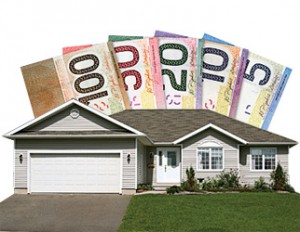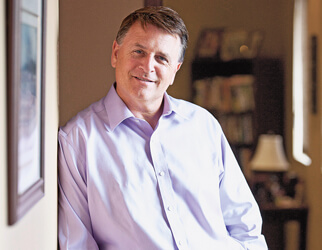 So just how much real estate should average investors have if they hope to achieve financial independence? This is a question I hope will be tackled at the North American Real Estate Summit, which is happening in Edmonton on Saturday, Aug. 24.
I’ll be on a panel that also features four prominent real estate experts or economists: Frank Margani, Ben Myers, Greg Coleman and Irv Kipnes. The grand finale of the event, put on by The Real Estate Investment Network (REIN), will be a talk by David Chilton [pictured] of Dragon’s Den and of course author of the two best-selling books, The Wealthy Barber and The Wealthy Barber Returns. The first 400 people to register will get a free copy of the latter book, and there will be a meet-and-greet with Chilton as well.
So just how much real estate should average investors have if they hope to achieve financial independence? This is a question I hope will be tackled at the North American Real Estate Summit, which is happening in Edmonton on Saturday, Aug. 24.
I’ll be on a panel that also features four prominent real estate experts or economists: Frank Margani, Ben Myers, Greg Coleman and Irv Kipnes. The grand finale of the event, put on by The Real Estate Investment Network (REIN), will be a talk by David Chilton [pictured] of Dragon’s Den and of course author of the two best-selling books, The Wealthy Barber and The Wealthy Barber Returns. The first 400 people to register will get a free copy of the latter book, and there will be a meet-and-greet with Chilton as well.
 According to REIN, Chilton will be “sharing how you can transition from aspirations to actually achieving your real estate investing goals using his proven strategies for success during these less than certain times,” in his talk entitled The Common Sense Guide to Financial Planning For Real Estate Investing.
According to REIN, Chilton will be “sharing how you can transition from aspirations to actually achieving your real estate investing goals using his proven strategies for success during these less than certain times,” in his talk entitled The Common Sense Guide to Financial Planning For Real Estate Investing.
Why I don’t like renting
Personally, I think a paid-for principal residence is “the foundation of financial independence,” a line I use more than once in my own financial novel, Findependence Day. By that, I mean that to achieve Findependence, one needs to be free of all debts, including mortgage debt. Now it’s true that renters are not technically in debt but I view the continued need to pay rent in the future as a variation of debt. It’s an obligation that never goes away and one that will likely rise as landlords raise rents to keep up with inflation.
Since we all need a roof over our heads, I’d far rather have a paid-for home than pay rent. True, a home will still have carrying costs, not to mention property taxes that rise as the home’s value increases. But in most cases, property taxes and even maintenance fees if it’s a condo, will be lower than what you’d pay for rent.
What about investment real estate? Putting aside the principal residence for a moment, I think a 10% or 15% allocation to real estate is about right for the average investment portfolio: either bricks and mortar if you’re inclined that way and are happy to put up with the vagaries of being a landlord; or through REITs or REIT ETFs if you prefer a more passive, hassle-free approach.
In past conversations with REIN members, I’m fully aware many real estate enthusiasts have far more than 10% or 15% in real estate. If multiple properties are owned, often leveraged, the allocation to real estate is probably closer to 100%.
Live in a house you can afford
What of Chilton’s stance on real estate? In a Maclean’s interview two years ago, Chilton revealed he lives “in a 1,300 square foot house.” And that’s including the basement. This is consistent with what he writes in The Wealthy Barber Returns. In the chapter Under House Arrest, he says a crucial piece of advice to achieving one’s financial plans is to “live in a house you can truly afford.”
Huge homes don’t just mean higher mortgages, they also mean higher property taxes, higher utility bills and more maintenance costs. Spending begets more spending and having stretched for the biggest home possible, couples also tend to stretch themselves to buy more or better furniture, appliances and cars, Chilton writes. I couldn’t agree more.
He goes on to talk about “good debt” and its three attributes: it’s taken on to buy an appreciating asset, the servicing doesn’t squeeze out savings and the debt will be retired before you do. He closes the chapter with, “I love home ownership, but make sure it’s you that owns the home and not the other way around.”
The power of leveragibility
In the original The Wealthy Barber, the chapter Home Sweet Home makes the point that a house often turns out to be a couple’s “best investment” because it’s often the only investment they ever made. Apart from the forced saving aspect, among the pluses are the tax-free status upon the sale of a principal residence and what Chilton refers to as “real estate’s finest quality: leveragibility.”
By that, he means an investment that not only has the ability to be borrowed against but also has the ability to “produce an income to offset the costs of being leveraged.” Since you can usually cover the costs of the borrowing from the rental income, such “leveragibility makes real estate the greatest investment of all time,” Chilton writes through the character James Murray. However, Roy (the Barber) then suggests that renting can have benefits too, since the monthly outlay is less and the difference could be added to the (10%) pay-yourself-first fund. So while home ownership can be an excellent investment, it’s not necessarily perfect.
A house is not a retirement plan
In the Maclean’s interview, Chris Sorensen suggested that “for many Canadians, buying a house has become part of their retirement planning.”
Chilton replied: “Yes, too much so.”
Sorensen then asked if stories of soaring home prices in Toronto and Vancouver indicated some level of “craziness” in the market.
Chilton said (remember, this was in September 2011) “In Canada, a lot of real estate markets are at their top limit. You can say that with a fairly strong conviction because you can compare it to incomes. At the very least, real estate is going to start stabilizing at these levels.”
He went on to add:
“A lot of people think they’re wealthier than they actually are because they have a fully paid-for $600,000 home. But you can’t spend your kitchen. And if you don’t have any savings or a Defined Benefit [pension] plan, you’ll be looking at that home later in life and be thinking it’s such a great asset. Well is it? Are you going to sell it and move way down? Most people don’t do that, so they’re having trouble harnessing that equity and turning it into a productive retirement asset that spins off an income. A lot of people have this illusion of wealth. I see this over and over again.”
Clearly, Chilton puts a lot of value on financial assets and is skeptical about those who choose to be “house rich” but “investment poor.” In The Wealthy Barber Returns he notes “an alarming number of retired Canadians have paid-for homes but insufficient savings.”
After re-reading and skimming his two books again, I could not detect any long passages about investment real estate above and beyond the merits of owning a principal residence. I guess we’ll have to wait until his talk in Edmonton to find out.
In the meantime, the June issue of MoneySense contains an excellent article by David Aston about boosting retirement income with rental properties. And in the upcoming September/October issue, our regular real estate writer, Romana King, takes a look at the best real estate deals in five major Canadian cities, including Edmonton.
Jonathan Chevreau is the author of Findependence Day and co-author of Victory Lap Retirement. Reach him at
[email protected], where he is the founder of Financial Independence Hub.
 So just how much real estate should average investors have if they hope to achieve financial independence? This is a question I hope will be tackled at the North American Real Estate Summit, which is happening in Edmonton on Saturday, Aug. 24.
I’ll be on a panel that also features four prominent real estate experts or economists: Frank Margani, Ben Myers, Greg Coleman and Irv Kipnes. The grand finale of the event, put on by The Real Estate Investment Network (REIN), will be a talk by David Chilton [pictured] of Dragon’s Den and of course author of the two best-selling books, The Wealthy Barber and The Wealthy Barber Returns. The first 400 people to register will get a free copy of the latter book, and there will be a meet-and-greet with Chilton as well.
So just how much real estate should average investors have if they hope to achieve financial independence? This is a question I hope will be tackled at the North American Real Estate Summit, which is happening in Edmonton on Saturday, Aug. 24.
I’ll be on a panel that also features four prominent real estate experts or economists: Frank Margani, Ben Myers, Greg Coleman and Irv Kipnes. The grand finale of the event, put on by The Real Estate Investment Network (REIN), will be a talk by David Chilton [pictured] of Dragon’s Den and of course author of the two best-selling books, The Wealthy Barber and The Wealthy Barber Returns. The first 400 people to register will get a free copy of the latter book, and there will be a meet-and-greet with Chilton as well.
 According to REIN, Chilton will be “sharing how you can transition from aspirations to actually achieving your real estate investing goals using his proven strategies for success during these less than certain times,” in his talk entitled The Common Sense Guide to Financial Planning For Real Estate Investing.
According to REIN, Chilton will be “sharing how you can transition from aspirations to actually achieving your real estate investing goals using his proven strategies for success during these less than certain times,” in his talk entitled The Common Sense Guide to Financial Planning For Real Estate Investing.